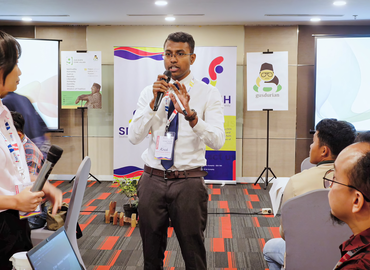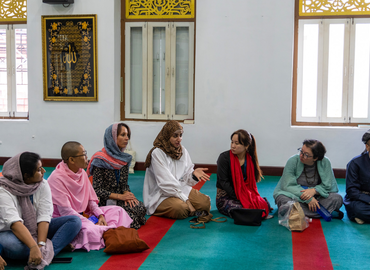In Indonesia, Social Media Campaign Promotes Interreligious Dialogue to End Violence Against Women

“Is there still slavery today?” asks a provocative Instagram post from the Indonesian organization Srikandi Lintas Iman.
“A slightly naive question, perhaps” the post continues, featuring various women holding up signs addressing the plight of domestic workers with inadequate salaries, mistreated migrant workers, and those who fall victim to human trafficking.
The post was part of an online campaign promoting dialogue to end violence against women, headed by 2015 KAICIID Fellow Wiwin Rohmawati and her team at Srikandi Lintas Iman, an interreligious organization based in in Yogyakarta dedicated to advancing solidarity, dialogue, empathy, and empowerment among women and children.
Running in November and December 2021, the campaign reached nearly 46,000 views. Due to its success, it was selected as a “Salam Campaign” grantee by the Wahid Foundation in cooperation with Google Indonesia and the United Nations Development Programme (UNDP). This support, in turn, allowed Rohmawati’s team to produce and launch a documentary entitled, “Boru Bawa Damai” (“Daughter of Peace”) about former extremist-turned-educator, Kartini Panggabean.
Rohmawati said the goal of both was to help create a safe space for women of different faiths to discuss violence and to increase public awareness about how such violence runs counter to values shared across religions.
In one Instagram live video, Rohmawati’s team focused on how there is a “teaching of understanding between men and women” in every religion. The video addressed how people of various faith backgrounds could apply teachings on equality to their daily lives and relationships.
That focus on religion, and an emphasis on interreligious dialogue, helps undermine systems that continue to oppress women across the world, said Rohmawati.
“Interreligious dialogue is key to promote the end of violence against women, because religion is part of our daily lives,” she said.
Ivy Sudjana, head of media and networking for the organization, said that during the COVID-19 pandemic, research from the Indonesian National Commission on Human Rights reported that violence against women increased significantly.
“At the same time, internet usage increased,” said Sudjana, “so we decided to push our campaign against violence on social media to counter the messages that can influence people to cause harm.”
It was not the first time Srikandi Lintas Iman ran a social media campaign. Before, they partnered with other organizations to counter extremism and confront hate speech against minorities. However, none of them had the reach that this most recent effort had, Sudjana said.
The campaign’s success was due in large part to training and support received from KAICIID. Rohmawati participated in KAICIID’s Social Media as a Space for Dialogue pilot training programme in 2021. Rohmawati said the training helped her team formulate, design, and implement a structured — and ultimately successful — social media campaign.
Harry Myo Lin, Programme Officer for the Asia Region Programme at KAICIID, said the training is inspired by a previous social media initiative in the Arab region. In his view, the programme in Asia is “an opportunity to launch a series of activities in the region focusing on countering hate speech through the responsible use of social media among target audiences including peacebuilders, policymakers, religious practitioners, and youth.”
The next Social Media as a Space for Dialogue training will take place later this month in Lisbon. Rohmawati will serve as a “Master Trainer,” sharing her experience alongside nine other peer trainers from seven Asian countries.
Initiatives like these, said Myo Lin, create “increased capacities for interreligious dialogue that promote inclusive peace and social cohesion and respond to relevant local and global challenges.”
In Rohmawati’s case, that means enlarging her organization's project yet again.
She believes the cultural moment is ripe for change around the issue of violence against women in Indonesia. With the recent passage of a national “Sexual violence eradication bill” on April 12, Rohmawati said that while the issue of violence against women is much bigger than before, so is the conversation around it.
“In society, women are more able to speak up about the violence they’ve experienced in the past,” she said, “our project is a part of that increased awareness and is dedicated to make sure women are not only behind the scenes, but up front leading the conversation.”

Communities suffer, not only from the echoes of broken men’…

Peacebuilding today requires more than technical solutions; it demands inclusive, values-…

![Wiwin Rohmawati [file:field-file-image-alt-text]](/sites/default/files/styles/project_image/public/dsc_7385_5.jpg.webp?itok=anxpGf06)
